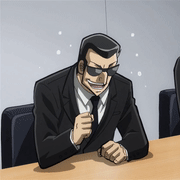|
There was an article in The Economist (which for some reason online is a video) about Japanese prisons. I've heard a lot of pride from Japanese people about their criminal justice system (especially execution, which still has an 85% support rate it seems), like it is the reason for Japanese society being so peaceful. I...strongly question that, but I have never been able to have a good discussion with a Japanese person about it, only me being told to gtfo until my country's crime rate is lower than theirs. Has anyone here had any better success?
Samurai Sanders fucked around with this message at 20:04 on Feb 24, 2013 |
|
|
|

|
| # ? May 12, 2024 19:28 |
|
Samurai Sanders posted:There was an article in The Economist (which for some reason online is a video) about Japanese prisons. I've heard a lot of pride from Japanese people about their criminal justice system (especially execution, which still has an 85% support rate it seems), like it is the reason for Japanese society being so peaceful. I...strongly question that, but I have never been able to have a good discussion with a Japanese person about it, only me being told to gtfo until my country's crime rate is lower than theirs. Has anyone here had any better success? I went to the Abashiri prison museum last winter and they basically tell you that it was a gulag. It was a pretty horrifying place, especially when you realize that they mostly sent political prisoners there. Of course this was over a century ago.
|
|
|
|
Shibawanko posted:I went to the Abashiri prison museum last winter and they basically tell you that it was a gulag. It was a pretty horrifying place, especially when you realize that they mostly sent political prisoners there. Of course this was over a century ago. On the other hand though, one of the guys who got executed last week was the guy who did the Akihabara massacre of 2008, that I only missed getting involved in by a few hours. edit: has the lay judge system done anything yet to improve the transparency of the police actions before trial, or not?
|
|
|
|
Protocol 5 posted:I've ready about the issue plenty, thanks. I fail to see what the US president would gain from publicly taking sides on it. mystes fucked around with this message at 22:15 on Feb 24, 2013 |
|
|
|
mystes posted:Oh, sorry, I only glanced at the article you were responding to and it looked from your first sentence like the "he" in your post was referring to Abe. That makes a lot more sense. I'm sure you can see that "Why would Abe possibly take a position on this issue" would be a slightly sillier comment. Protocol 5 posted:That was pretty funny. Abe got clowned by the US press corps something fierce. I also thought it was hilarious that they made a point of noting that he didn't respond to a request to explain his position on the Senkaku Islands dispute. Never mind that any response at all would draw criticism from someone for no appreciable gain, but why on Earth would he give a gently caress at all? The territorial disposition of some loving barren rocks a hemisphere away are bound to be pretty low on his list of priorities of things to formulate positions on. I definitely agree that Obama is better off not publicly taking sides on this, but he should definitely give a gently caress about a major point of tension between two of his biggest trading partners.
|
|
|
|
Samurai Sanders posted:Well, that's not a typical case, I'm talking about the normal Japanese process of obtaining confession without lawyer present and without much thought to evidence, going straight to prison where talking is forbidden and unpaid work is compelled, and if the crime is bad enough getting surprise executed. Prison is a whole different bag of crazy. It's so incredibly regimented that it's pretty well close to psychological torture. You get what, three cups of water with which to watch yourself? Speaking when "not allowed to", among other things, is punished by chobatsu, for example. Not allowed to stand except when they tell you to, etc. It's hard to even know where to begin. quote:edit: has the lay judge system done anything yet to improve the transparency of the police actions before trial, or not? Nope. Lay judges are only used in things like murder and what not that are already all but decided before they even begin, and additionally, a guilty verdict can only be given if the professional judge attending also votes guilty. They certainly aren't going to go questioning police interrogation methods or anything, I'll tell you that much. The fundamental problems of the justice system here, such as the prosecution still getting to determine what evidence is used in trial (see: Govinda Prasad Mainali case for a good example), still remain. Samurai Sanders posted:only me being told to gtfo until my country's crime rate is lower than theirs. Has anyone here had any better success? Nope. Comparing Japan to America is the standard get out of jail free card, nevermind how broken America's _____ may be or how hard the Japanese authorities may cook the books on crime/traffic deaths/average working hours/whatever you want to discuss. You'll notice they never compare Japanese prisons to those in Norway or anything, where there's markedly less institutional problems along the lines of the American system, while also treating the inmates much better. Sheep fucked around with this message at 23:09 on Feb 24, 2013 |
|
|
|
Arguing that Japan's low crime rate makes it's legal system better then anyone else's is like saying since the level of reported sexual assault crimes are high and Sweden and low in Mexico that rape isn't a problem in Mexico. There are some terrible problems with Japan's legal and police system. They have very little effective investigatory power, a residual fear from the pre WW2 days when the state police were a terror force imposing control, and as such the state of forensics and CSI level science is decades behind the US. One of the major reasons they force confessions is because it secures them from having to present a forensic based defense and likely be ripped apart by other experts. Their murder statistics are also laughably flawed. Any time a dead body is found if they can they label it as a suicide or body dump so the don't have to pursue a difficult and possible open ended investigation. Often they don't even conduct an autopsy on bodies, especially those of foreigners, and cremate right away. Their laws regarding sexual assault, rights of woman, and sexual trafficking would astound anyone who thinks of Japan as a first world enlightened country. In some of those aspects, Japan was on the same list as a couple for third world hellholes for its laws or lack thereof on sexual slavery. To top it all off, for every person they force a confession from, actual criminals are likely to get off free for resisting because prosecutors are expected to have near 100% conviction rates. If a prosecutor brings a case to trial and loses, it's likely to be the end of his career. Every major country has skeletons in its police and legal process, but Japan's are particularly egregious because it's public image is so radically different from reality. Everyone in the world knows about the Rodney King beatings and that NY police were horrifically corrupt in the 70's due to movies like Serpico, and the modern day system isn't exactly perfect, but the US culture at least advocates for suspect's rights and tons of advocacy groups and lawyers fight to keep people from suffering unjustly. In Japan the children of defense attorneys are bullied and harassed for their parents work, being falsely arrested but released is a social stigma that people lose their jobs for, and something like the ACLU would never gain any public support or acclaim for their work.
|
|
|
|
Samurai Sanders posted:There was an article in The Economist (which for some reason online is a video) about Japanese prisons. I've heard a lot of pride from Japanese people about their criminal justice system (especially execution, which still has an 85% support rate it seems), like it is the reason for Japanese society being so peaceful. I...strongly question that, but I have never been able to have a good discussion with a Japanese person about it, only me being told to gtfo until my country's crime rate is lower than theirs. Has anyone here had any better success? I've gotten people to at least admit that there are specific things about Japan that are incredibly screwed up and which ought to be clear violations of the UN human rights charter which Japan is a party to, whether they like it or not, but most of it is always turned around with the aggravating fallacy "you're not even trying to see it our way" (as many of my debates with Japanese go -- part of the reason I've become quite sour on even attempting it), which is pretty dumb when they as Japanese admit something is hosed up but refuse to acknowledge it as their problem. See: the typical neto-uyo defense. (For those not fluent in Japanese slang: 'neto-uyo' are Japanese netizens who are super nationalist right-wingers. Sort of like Anonymous with a raging boner for Ron Paul) I have much better success speaking to people in their sixties and above about it. They place blame on the education system, where the government overhauled the morality classes to make sure they didn't get kids getting all uppity like they did in the 1960s (no source but personal anecdotes, but I think if you look up things like the mass protests over the US-Japan Security Treaty and try to imagine Japanese youth doing that now...).
|
|
|
|
Reverend Cheddar posted:I've gotten people to at least admit that there are specific things about Japan that are incredibly screwed up and which ought to be clear violations of the UN human rights charter which Japan is a party to, whether they like it or not, but most of it is always turned around with the aggravating fallacy "you're not even trying to see it our way" (as many of my debates with Japanese go -- part of the reason I've become quite sour on even attempting it), which is pretty dumb when they as Japanese admit something is hosed up but refuse to acknowledge it as their problem. See: the typical neto-uyo defense. edit: I'm against the death penalty but I'm at least willing to listen to arguments in favor of it, but not the terrible arguments I have heard from Japanese people. The two main ones are "it's a substitute for the family getting vengeance" and "if your loved one was killed there's no way you could still be anti death penalty", but what I have never been able to get across (maybe my Japanese isn't good enough?) is that those are arguments against institutional law and order itself, the very idea of a neutral third party deciding punishments instead of the bereaved. Anyway I gave up on that a long time ago. I haven't run into any topic that gets Japanese people more riled up than that, even Korean related issues. Samurai Sanders fucked around with this message at 00:12 on Feb 25, 2013 |
|
|
|
Samurai Sanders posted:Anyway I gave up on that a long time ago. I haven't run into any topic that gets Japanese people more riled up than that, even Korean related issues. Oh I have. Euthanasia, ironically enough. You'd have thought I'd set off the Tsar Bomba or something.
|
|
|
|
Reverend Cheddar posted:Oh I have. Euthanasia, ironically enough. You'd have thought I'd set off the Tsar Bomba or something.
|
|
|
|
pentyne posted:Their laws regarding sexual assault, rights of woman, and sexual trafficking would astound anyone who thinks of Japan as a first world enlightened country. In some of those aspects, Japan was on the same list as a couple for third world hellholes for its laws or lack thereof on sexual slavery. Funnily enough, I just got done listening to the morning announcements here, and yet again another student was molested on the way home from school. I reckon during an average year, out of 900 female students we have about 50 cases of molestation reported to the school, and almost never are the police contacted. So during their 3 years here, around 15% of students (assuming there aren't any repeat cases) will report being molested. Then you've got the stigma associated with being a victim of crime, causing trouble by contacting the police, etc. and you can imagine how low reported crimes vs the actual crime rate is. Couple with that the fact that paying blood money is common practice and perfectly acceptable legally, and even reported crimes don't have to go on record because the police can just do settlement mediation and sort it all out. Japan is great in terms of violent crime if you're a guy (and not foreign), but the amount of sexual assaults here are unbelievable. I can't even begin to fathom what the actual crime rate is, but for certain categories it's certainly several multiples higher than the reported rate. Murder, any sort of sexual crime, and fraud are going to be pretty high up there. Also Japan routinely deports victims of human trafficking and sexual slavery instead of investigating their cases, so that's another way they fudge the numbers. Edit: I'm like 90% sure the NPA doesn't include jidan'd cases in reported/cleared statistics, but I'm not about to go digging through white papers at 9am on a Monday. Sheep fucked around with this message at 00:55 on Feb 25, 2013 |
|
|
|
Samurai Sanders posted:Huh, I never asked about that. Is that related to why they are so reluctant to be organ donors? The organ donor thing is contentious for a different reason; it's a huge qualm with the body not being whole and complete when you're buried. I think it comes from Shinto ideas about the purity and completeness of the body, that's also why people feel weird about pierced ears sometimes. People's jaws hit the floor when I told them I got my ears pierced when I was twelve. I didn't tell them that most girls in Latin America are pierced soon after birth.  About euthanasia, I don't know if it relates to that or not, but my impression was that it doesn't. But basically it was seen as like the most selfish thing you could possibly do to your family. I argued it to the nines: I said the patient might feel they are a burden on their own family, they shot back with something like 'who cares about money or trouble when it's your own family'; I went for the point where a family would be causing a person to suffer due to their own selfishness and they fought back with the fallacy 'family is supposed to live for each other no matter what and it's our responsibility to take care of everyone'. I'm sure you're aware yourself how important the family unit is in Japan, and that's really the heart of the matter. I didn't reference any specifics like Schiavo or Quinlan directly (cause how would they know? Schaivo, maybe, but I doubt it ten years later), but I also tried to say that there are absolutely cases where there is no hope of recovery whatsoever and I still got slapped with the accusation that I thought it was all about money and inconvenience, rather than it being an issue of dignity and the ability to recognize when you're beyond the reach of medical help. And you'd think that human dignity would be the tone to strike, considering Japan and seppuku. I think what has happened is that suicide has become so tantamount to personal shame and giving up in modern society, that euthanasia is sort of viewed on the flip-side, that it would be a shameful thing to just let someone in your family die, no matter what the reason. So it's not quite on the level of self-delusion that we saw in the case of Schaivo's parents, but it doesn't feel far away. I feel like I'd like to translate some critical essays by Japanese, to help spread some dialogue about what Japanese pundits are on about, but at the same time I feel ambivalent about it, like I'd be fueling both sides of the echo chambers. I genuinely want to spread more dialogue about what goes on in Japan that isn't accessible to most of the world, but at the same time it feels so useless to do it... Reverend Cheddar fucked around with this message at 13:23 on Jun 18, 2020 |
|
|
|
Interesting discussion. For those of you in the United States, how would you compare the arguments of pro-death penalty Americans you've encountered versus pro-death penalty Japanese? Also on the topic of sexual assaults and the Japanese justice system, if you haven't checked out a film called 'I Just Didn't Do It' ('それでもボクはやってない'), get on it. It's about a man (falsely) accused of groping a school girl on a train, and the nightmare that ensues once he is arrested. Although fictional, it's a real eye-opener. http://ja.wikipedia.org/wiki/%E3%81%9D%E3%82%8C%E3%81%A7%E3%82%82%E3%83%9C%E3%82%AF%E3%81%AF%E3%82%84%E3%81%A3%E3%81%A6%E3%81%AA%E3%81%84
|
|
|
|
ozza posted:Interesting discussion. For those of you in the United States, how would you compare the arguments of pro-death penalty Americans you've encountered versus pro-death penalty Japanese? Also I see in it a belief in the infallibility of the police and courts, which I never see here (though maybe I'm just not asking the right people). edit: looking back at the article I read, it seems to be based on an internet poll so I guess the data is suspect. Support for the death penalty definitely is overwhelming there though, anti death penalty advocates can barely be heard. Samurai Sanders fucked around with this message at 02:05 on Feb 25, 2013 |
|
|
|
As far as I know there are no Japanese people on the forums, much less in these kind of threads. For the most part the only people who would be able to follow this level of dialogue anyways would be those raised abroad, which kind of doesn't qualify. Do you have any links to some essays handy? I'd be interested in reading them even if you don't feel like translating. ozza posted:Also on the topic of sexual assaults and the Japanese justice system, if you haven't checked out a film called 'I Just Didn't Do It' ('それでもボクはやってない'), get on it. It's about a man (falsely) accused of groping a school girl on a train, and the nightmare that ensues once he is arrested. Although fictional, it's a real eye-opener. http://ja.wikipedia.org/wiki/%E3%81%9D%E3%82%8C%E3%81%A7%E3%82%82%E3%83%9C%E3%82%AF%E3%81%AF%E3%82%84%E3%81%A3%E3%81%A6%E3%81%AA%E3%81%84 This is kind of what the public were being led to believe happened to that JR Kobe exec who hung himself in an Osaka public park bathroom in December after being caught molesting a chick on the train. Except he had been habitually molesting the same girl for two years straight. Link, link and link. Also one of the the scariest things here is the number of police officers and attorneys being caught doing illegal stuff. There have been so many reports in the news of police officers caught molesting girls, video taping up girls' skirts, etc. over the past year that I've quite literally lost count of them. Then you've got the public prosecutors forging evidence and being taught that foreigners don't have human rights (technically not wholly untrue) and the rabbit hole just gets deeper and deeper. Sheep fucked around with this message at 02:04 on Feb 25, 2013 |
|
|
|
Sheep posted:As far as I know there are no Japanese people on the forums, much less in these kind of threads. For the most part the only people who would be able to follow this level of dialogue anyways would be those raised abroad, which kind of doesn't qualify. Yeah if any of those magazines were actually online! There was a book full of essays called something like 日本の未来について話そう that I thought I might take a crack at until I learned it's got an English translation. I thought it might be easier to just start translating the op/eds in the newspapers cause those at least you can read online.
|
|
|
|
Sheep posted:As far as I know there are no Japanese people on the forums, much less in these kind of threads. For the most part the only people who would be able to follow this level of dialogue anyways would be those raised abroad, which kind of doesn't qualify. I always hear horror stories about the treatment of foreigners by the legal system in Japan. The mentality towards outsiders in Japan is one of the worst in the world short of rounding them up and deporting them. Like you could move there as a young adult, live there for 30 years, and still always be regarded as a foreigner and get attacked during the ultra right wing nationalist rallies.
|
|
|
|
ozza posted:Interesting discussion. For those of you in the United States, how would you compare the arguments of pro-death penalty Americans you've encountered versus pro-death penalty Japanese? Haha, I saw this in the theaters when it first came out, on a date no less. That was awkward as gently caress. The ensuing argument about how tossing the presumption of innocence out the window to placate an angry populace rather than actually trying to change the attitudes and conditions that cause or enable molestation (sexism, overcrowding etc.) doesn't actually help anyone torpedoed that relationship pretty much instantly. In my defense: she picked it. The overall crowd reaction was impossible to read, but I do recall a lot of whispered conversations among people on the way out to the lobby, so it at least gave them something to think about.
|
|
|
|
pentyne posted:I always hear horror stories about the treatment of foreigners by the legal system in Japan. The mentality towards outsiders in Japan is one of the worst in the world short of rounding them up and deporting them. Like you could move there as a young adult, live there for 30 years, and still always be regarded as a foreigner and get attacked during the ultra right wing nationalist rallies. Read interviews with the (few) white people left on Ogasawara island. Japanese citizens for the most part, but still regarded as gaijin by the Japanese. Relevant NY Times article here. quote:“They call me foreigner,” said Sutanrii Minami, 64, a tour guide who also goes by Stanley Gilley and who looks Polynesian. “I’m not a foreigner. I was born on this island.” Sheep fucked around with this message at 03:34 on Feb 25, 2013 |
|
|
|
It's incredible how much it can screw with people over there. I'm going to be curious how the little brother of one of my best girlfriends ends up. The family is from Mumbai (the dad has been in Japan for twenty years, his wife and daughter for thirteen) but the little brother was born in Japan and is growing up there. He's just this adorable little Indian boy who only speaks Japanese. I get the feeling he'll become a TV panelist as one of those 'experts' on India or something.
|
|
|
|
ozza posted:Interesting discussion. For those of you in the United States, how would you compare the arguments of pro-death penalty Americans you've encountered versus pro-death penalty Japanese? It's based on a true story, the Wikipedia page mentions the history behind it. It's really unfortunate that this movie didn't really spark anything among the population, it's a brilliant look at how flawed the justice system is here and you can't help but get pissed off by watching it. I mean, the defense more or less has a slam-dunk case, but still loses due to arbitrary reasons.
|
|
|
|
I was surprised to find out how much of the Phoenix Wright legal system was based on the actual Japanese one and not some dystopian future world with a hosed up sense of justice. The way they introduce juries at the end of one of the games with like "well it may seem crazy to let ordinary people determine the fates of criminals..." or how trials are only allowed to last three days and judges are incompetent and convict everyone.
|
|
|
|
I remember when they were leading up to the introduction of the lay judge system, I read a Yomiuri article in which a lawyer explained that judges often convict because to not do so will piss off the prosecutors, cops, and the victim's family. So unless there's some kind of political pressure to acquit, they'll convict and then sentence based on the relative strength of the prosecution's case. If it's airtight, they'll go the full nine, if it's paper thin the poor gently caress will get off with paying a fine or making a written apology (yes, that actually happens with some petty crimes). Of course, a criminal record will turn you into a pariah, so even a slap on the wrist is pretty cold comfort.
|
|
|
|
I imagine a lot of the problems with the Japanese legal system are the holdovers from the strong cultural emphasis on shame, conformity, and obligation. I think the system in India, when not rife with corruption is still heavily controlled by the caste structure and the lower caste have no legal recourse when they get victimized.
|
|
|
|
I think it was on another forum that I heard this, but a lot of the problem present in the justice system probably has everything to do with the judges. I had heard that the unlike other countries where judges are often former lawyers who had years of experience in law. Judges in Japan may not necessarily be lawyers or have ever been lawyers. It had been mentioned that many judges are picked from students straight out of law schools in Japan and are often interviewed on their beliefs. So basically the court system is shaped so that no judges will be put in place that will necessarily affect major social change on the system. The context of this information came on talks about the issue of child abduction and the real reason for the push for the Hague convention (which you'd never guess unless you knew). How accurate this is I don't know, but considering that doctors in Japan don't go to a medical school or go through years of residency, I'm keen to believe it. Take a test, have a chance to become a judge.
|
|
|
|
Kenishi posted:I think it was on another forum that I heard this, but a lot of the problem present in the justice system probably has everything to do with the judges. To be fair to the Japanese, you're just describing the civil law system. I think at least some of the issue that Americans (and other Anglophones) have when assessing the Japanese legal system is not that it is uniquely Japanese but that, like everywhere else that wasn't run by the British at some point, it is heavily civilian. Under the Meiji reforms the Japanese legal system was directly modeled on the German and French legal systems, in particular the German system. The Japanese Civil Code, for instance, is in large part, I've been told, a translation of a draft of the German Code. Even after the Occupation, the Japanese courts are very, very German in style. That is to say that judges are indeed recruited straight out of law school, as are prosecutors, and being a judge is, as far as I can tell from my Japanese colleagues, not seen as being as prestigious as in the common law system. I assume judges serve some kind of extended apprenticeship and training program--I happen to know a Dutch judge and that's how their system works--but I'm really not certain about the details. I was going to write a longer post about the Japanese criminal law system, but I think the central problem is the obvious one that there's no impetus to change anything (see also: Japan). Nobody cares about prisoners. Without old people, businesses or farmers getting behind it the LDP won't do anything. So laws, like the Prison Law from 1908, just don't get properly updated. And, there's no obvious crime problem. It's the safest country in the world, they say. I think a lot of people are content with the system as is. I think that's also why organized crime is so tolerated. Why give the police stronger enforcement powers (so they could seriously tackle organized crime) when there's "no crime"? Why give prisoners rights? Of course, change is difficult everywhere, but Japan, at least for past few decades, has been so much worse at it.
|
|
|
|
I guess there are just so few people who have spent any time in prison in Japan that almost everyone is likely to have never met one. Is it even possible for an American not to know someone who has been in an institution for at least a little bit?
|
|
|
|
One person made the point to me that Japan and the US differ in the style of the crime they have and can also sort of explain the ineffectiveness of the police in Japan in regards to the yakuza. The US by cracking down on crime syndicates has a slew of street gangs and violent crime, whereas Japan gives the yakuza carte blanche to operate so long as they keep to themselves basically (essentially giving the unspoken message like 'alright boys and girls, if you wanna do crime, you can go to the yakuza but you're on your own if you get in way over your head'). I guess it depends on how you like your poison. Plus there is also a very huge push to convey police as kind of your friendly neighborhood Mr. Rogers-ish civil servants, just with a whacky-stick, with mascots and stuff. Guess which one's the Japanese mascot:   I guess Scruff isn't as stone-cold as I remembered him as a kid but you get the point. Of course Japan uses mascots for pretty much everything -- one of the more fascinating subjects for research, if anyone wants to look into it, is how Japan has used soft power through cuteness to soften their image throughout Asia through mascots like Hello Kitty -- but even a cursory look at how they present a lot of their police forces shows how they want to project a gentle image: http://idleidol.net/japan%E2%80%99s-police-mascots/ I'm fond of that pufferfish one.  But you can see what image Japan wants to give people about how to think about police. But you can see what image Japan wants to give people about how to think about police.I think, but am not sure, that police aren't even the ones that go after crime, I think it's detectives actually? I really don't know. It would totally explain the slew of buddy-gumshoe TV shows you get in Japan.
|
|
|
|
I thankfully haven't had any direct experience with cops in Japan, aside from the occasional cursory eyefuck, but I do have a pretty funny anecdote from a former coworker. The guy had his apartment broken into while he was at work, so he called the cops and made sure not to touch anything. A couple of uniforms show up to take a statement and get a list of what's missing. They eventually wrap it up, and on their way out, one of them actually has the gall to criticize my former coworker for not cleaning up before they arrived. At that point he pretty much abandoned all hope of every getting any of his stuff back.
|
|
|
|
Kenishi posted:The context of this information came on talks about the issue of child abduction and the real reason for the push for the Hague convention (which you'd never guess unless you knew). Don't leave us hanging, dude ... Edit: I'm guessing it's something to do with a J politician needing to use the Hague convention to get their own kids back from the clutches of an evil furrin spouse who Weatherman fucked around with this message at 00:09 on Feb 26, 2013 |
|
|
|
Samurai Sanders posted:Also I see in it a belief in the infallibility of the police and courts, which I never see here (though maybe I'm just not asking the right people). There is some pretty major dissent in this though. No one really talks about it outside of Otaku and intellectuals though, just like all politics.
|
|
|
|
Gleri posted:To be fair to the Japanese, you're just describing the civil law system. I think at least some of the issue that Americans (and other Anglophones) have when assessing the Japanese legal system is not that it is uniquely Japanese but that, like everywhere else that wasn't run by the British at some point, it is heavily civilian. Under the Meiji reforms the Japanese legal system was directly modeled on the German and French legal systems, in particular the German system. The Japanese Civil Code, for instance, is in large part, I've been told, a translation of a draft of the German Code. Even after the Occupation, the Japanese courts are very, very German in style. That is to say that judges are indeed recruited straight out of law school, as are prosecutors, and being a judge is, as far as I can tell from my Japanese colleagues, not seen as being as prestigious as in the common law system. I assume judges serve some kind of extended apprenticeship and training program--I happen to know a Dutch judge and that's how their system works--but I'm really not certain about the details. It would perhaps be better to say "Japanese courts are very much like German courts were at the turn of the twentieth century". German judges all go through law school and are usually recruited from the top few percent of a given class. That means they had internships at both a lawyer's and at the prosecutor's office so I guess the whole judge+prosecutor vs. the defense lawyer doesn't happen as much (it is an open secret that judges lean towards prosecution, not least because most prosecutors try to build a watertight case including forensic evidence). I'm no expert on how courts in Germany (read: Prussia) were run when Japan modernized, but going by the rest of society, they were probably very conscious of their rank in society and hilariously racist. But Germany has reformed in a way I guess Japan has not. And, of course, there is nothing I have read in this thread that suggest that Trial By Jury would have any major impact. What kind of jury member would rock the boat by "not being convinced enough"?
|
|
|
|
Here's a really good article about some of the silliness of the legal system here.Weatherman posted:Don't leave us hanging, dude ... The government has stated repeatedly that the convention, when (and if) signed and laws are put in to place, will not be applicable retroactively; everyone who has already lost their children to abductors in Japan is SOL. And again, don't forget, "verbal arguments" are going to be classified as domestic violence so it won't matter anyways, provided you've ever argued with your spouse. Also there is at least one member of the LDP who is (or was, prior to the last election? I don't follow that poo poo) a child abductor - she absconded with her children from America citing the tried and true "domestic abuse" line while making zero attempt of going through the American court system, opting instead to kidnap her children from their country of habitual residence and take them to Japan. I can't recall her name off the top of my head but it's out there if anyone cares to look, I'm pretty sure there was a JT article on it back when the Hague convention was actually still in the domestic news. Sheep fucked around with this message at 00:33 on Feb 26, 2013 |
|
|
|
So because defense attorneys can be expected to lose almost every case they take, does that mean being a defense attorney gives you a really low social status? Would you be ashamed of it? Is it only the shittiest law students that go down that path?
|
|
|
|
Weatherman posted:Don't leave us hanging, dude ... I went and looked and it wasn't in the main wall-o-text that the guy posted but in a reply to someone. I'll just quote the entire post for context. (Note, this isn't from SA) mcpike posted:I have *very* personal experience with this topic. I have not been given any access to my American-born sons for nearly a year and a half. I also personally know several of the parents covered in the show, and many of the both Japanese and Foreign parents that were shown protesting in the streets of Tokyo - asking for reform of the system. Here's the post talking about the judge thing. I can't comment on the accuracy on this claim but knowing Japan I suspect its true. mcpike posted:
Kenishi fucked around with this message at 09:10 on Feb 26, 2013 |
|
|
|
quote:Japan doesn't really have a "rule of law" system. Should really be in the OP.
|
|
|
|
That's yet another thing that will cause dumbfounded stares, telling people your parents are divorced but had joint custody. When I talk about my situation, with divorced parents and an oblong-joint custody, everyone just kind of shakes their head and is like ”この国はねえ。。。” totally resigned that it's impossible in Japan. I won't go into it right now cause it's late and I gotta sleep but I think this issue is framed better not in terms of family, but of house. That's why things like 戸籍 exist ('koseki': the family register. I know I'm being incongruous with words but that's the English term), to reinforce the house unit. House names are passed down paternally like ours, but once you don't belong to a house you lose it. Another famous example of this is Junichiro Koizumi! He has a son whom he has literally never seen in his life because of things like this (the wife was pregnant when they divorced or something). So he got custody of his first two sons who are Koizumis, and a third son who's a, I dunno, a Suzuki. Even though all the brothers are full brothers. Japan!
Reverend Cheddar fucked around with this message at 07:37 on Jul 18, 2013 |
|
|
|
Caution, Extremely Anecdotal: Ever since I found out about this I've been trying to bring it up with Japanese people (this is in Tokyo), and the responses have been pretty horrifying. It seems widely accepted that after a divorce whichever parent doesn't keep custody will never see their kids again, at least not until adulthood. A common argument has been that this is "better for the children," and makes it easier for them to get used to their new step-parent. Which is obviously massively flawed. It's also been argued that this is better for the other parent as well, because they get to make a clean break and "start over." Bonus horror: Since the discussion has been about kids and stuff, adoption sometimes comes up too. The general consensus seems to be that adoption is unnatural and parents of adopted kids must be forcing themselves. Basically what I'm saying is that this news story has resulted in me lowering my opinion of a lot of people I speak with fairly regularly.
|
|
|
|

|
| # ? May 12, 2024 19:28 |
|
His youngest son even tried to turn up at a political rally in Tokyo and was turned away, so for what it's worth, Koizumi himself has basically washed his hands of the thought of even meeting the kid anymore. I know a JET couple here who is trying to adopt a Japanese kid. They were finally approved, but it boils down to the fact that basically they get to pick from the kids Japanese couples don't want to adopt. I feel disgusting even typing that out, but that's how it rolls here. Sheep fucked around with this message at 10:07 on Feb 26, 2013 |
|
|
















